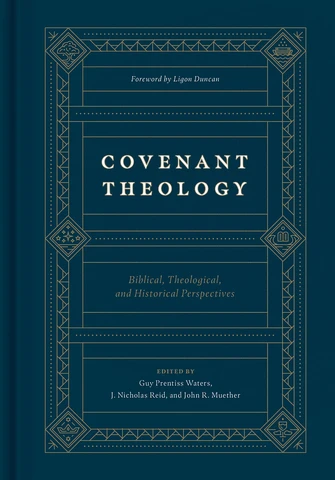
Guy Prentiss Waters, J. Nicholas Reid, and John R. Muether, Eds.
Reviewed by: Joshua A. Downs
Covenant Theology: Biblical, Theological, and Historical Perspectives, edited by Guy Prentiss Waters, J. Nicholas Reid, and John R. Muether. Crossway, 2020. Hardcover, 608 pages, $39.09 (Amazon). Reviewed by OP ruling elder Joshua A. Downs.
With brevity and power, Westminster Confession of Faith chapter 7 describes the Lord’s condescension to bless his creatures. In summary form it is this: God makes covenant. When we seek to learn about who God is, to a great degree our theological energy is spent learning what he has done in covenant with us. Specifically Reformed theology has capitalized on Scripture’s covenant structure to understand the Lord’s work of redemption in time, from the covenant of works with Adam in the garden to the covenant of grace whose substance is Christ.
Here in thirty-one essays, twenty-six pastors and theologians unfold God’s ways of relating to creation by covenant. The authors (all past or present professors at the Reformed Theological Seminary campuses) survey the biblical covenants, examine how those covenants are discussed in other parts of Scripture, study how the church has understood covenant language over the centuries, and finally interact with the various ways covenant theology comes into contact with the wider academic world in contemporary theology, ancient Near East studies, dispensationalism, and new covenant theology, among others.
But surveys of covenant theology abound, and so one may ask whether we need another work like this for a general audience. To begin, the volume has significant strengths, especially for confessional folk. Its size, for one, allows the authors to explore thoroughly the biblical foundations of the covenant of redemption, for example, while also devoting space to Dutch theology, the sacraments, and Karl Barth in addition to the standard topics of the covenants with Abraham, Moses, David, etc. Additionally, John Muether’s annotated bibliography and Ligon Duncan’s masterful foreword justify the volume.
But perhaps the greatest strength when compared with classic works on covenant theology (which typically exposit the author’s own views in relation to would-be interlocutors) is this volume’s general approach: the authors survey the major literature up to the present, summarize influential views, assess them, and defend their own views, all in a relatively accessible package (Greek and Hebrew are used, but not to the point of distraction). This means that instead of getting covenant theology as digested by so-and-so, the reader surveys a broader picture of how the biblical passages and historical debates have been understood within the church, which then situates how each confessional writer articulates his view. Creedal boundaries, personal opinion, and practical application share a healthy relationship throughout.
And there are explorations of topics especially relevant for OP readers. In two essays devoted to the covenant of works, the authors use scriptural passages, such as Hosea 6, 1 Corinthians 15, Galatians 3, and Romans 5 and 10, to defend the doctrine and its pivotal function in covenant theology as a whole. John Murray’s view, Federal Vision, the role of grace, and the implications for the Christian life feature as well. Then in the historical section of the book, the covenant of works appears again. This section explains how covenant, or federal, theology developed in the Reformation and post-Reformation periods largely based on the “representation principle” present in Romans 5:12–21. This can be seen in the writings of Zwingli, Calvin, Bullinger, Fenner, Rollock, Perkins, and others.
In sum, this volume is worth a place alongside classics of the genre. Since covenant theology outlines every phase of redemptive history and touches on so many biblical passages, private devotion as well as virtually any Christian education class will be deepened for including our confession’s rich teaching as expressed in this book on God’s condescension to bless his creatures.
December 14, 2025
December 07, 2025
November 30, 2025
November 23, 2025
November 16, 2025
November 09, 2025
November 02, 2025
© 2025 The Orthodox Presbyterian Church